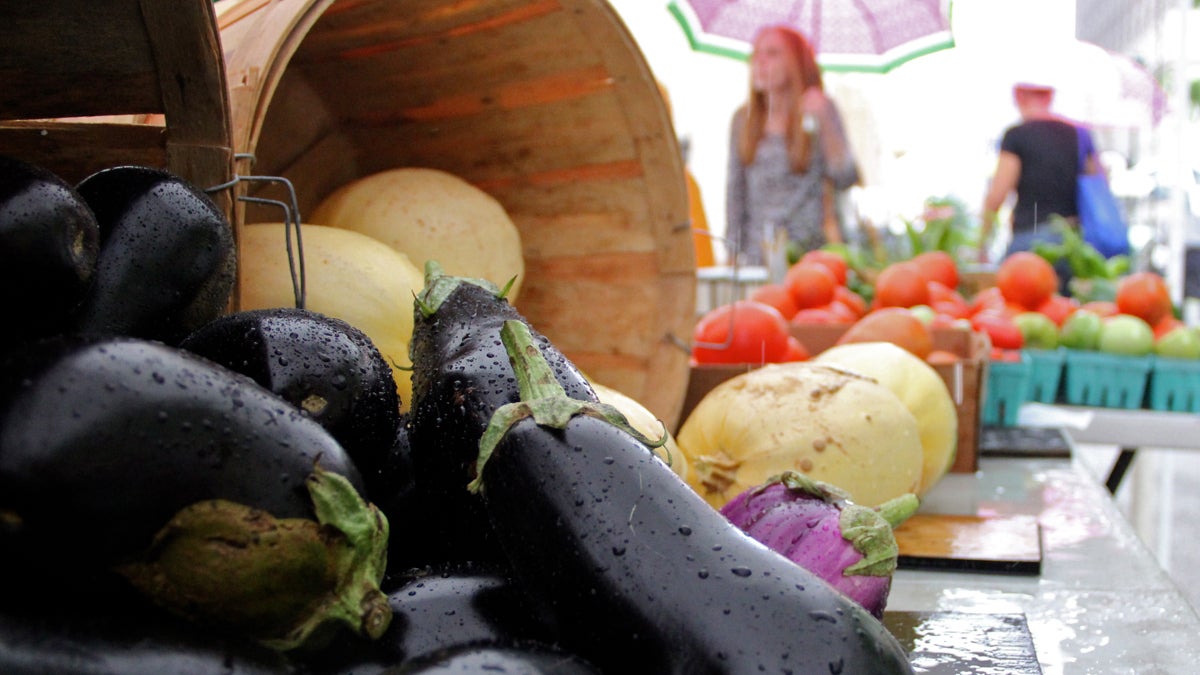For region’s farmers, wet weather is mixed bag

Record rain in June and July has had mixed results for local farmers. (Emma Lee/for NewsWorks)
After the wettest day on record in Greater Philadelphia earlier this week, downpours put the area under another flash flood warning Thursday, luring only a handful of shoppers to brave outdoor farmers markets in the city.
As for farmers well outside Philadelphia proper, heavy rain has blessed a few, but plagued most.
Record rainfall in the first two months of the summer has disrupted planting and harvesting schedules, washed away fertilizers and pesticides, and put farmers on high alert for disease threats, agricultural experts in Southeastern Pennsylvania and South Jersey say. But it also may boost some crop yields.
So have farmers fared well or poorly this season? The answer depends on where they are and what they grow.
Floods and fungus versus soy beans and straw
“If you look at Pennsylvania as a whole, too little rain is worse than too much,” said Jeffrey Graybill, agronomy educator at Penn State Cooperative Extension in Lancaster County.
Floods can create an environment where fungus and blight flourish, he said, but they also fuel extra growth and larger yields.
This year, for example, there has been more fungus than usual on the wheat crops, Graybill said.
But such “disease pressure” is manageable with crop rotation and other techniques, Graybill explained, predicting near-record corn and soy yields this year.
And with most of Pennsylvania land unirrigated anyway, he said, “if there’s no rain, there’s nothing you can do.”
Agricultural agent Ray Samulis of Burlington County’s Rutgers Cooperative Extension says farmers in the sandy, well-irrigated South Jersey soil couldn’t disagree with Graybill’s sentiments more.
“I’ll give you the name of fifty farmers that say the exact opposite of that,” said Samulis.
Excessive rain causes a chain reaction, Samulis continued, delaying the harvest of hay straw and wheat so that farmers are forced to plant soy beans in the same fields later in the season.
Samulis predicted that when rain washes off fungicides, vine crops like cucumbers and melons will also be troubled by funguses.
After delays, signs of hope
According to Montgomery County extension agricultural educator Andrew Frankenfield, the timing of rainfall continued to delay the corn and soybean crops in his area even after they had been planted.
“The heavy rains came – two, three, four inches sometimes – really quickly,” he said. “And, unfortunately, the soil stayed wet, the seeds rotted, and they had to replant.”
Farmers in sandy-soiled Gloucester County have had better luck than Burlington County, boasting unusually big and sweet peaches.
“When they were very tiny in June – then, it was cloudy and rainy and there was a lot of water going up into the plant,” Michelle Casella of the county’s agricultural cooperative extension said.
A mid-July heat wave, she continued, hit just in time to sweeten the already juicy peaches.
Despite some cases of potato blight, Casella added that most farmers in her area have dodged the worst of funguses and other diseases so far thanks to planting beds designed to drain excess water.
The final verdict on the summer harvest won’t be in until the end of August, Lancaster’s Graybill said, but he ventured an optimistic prediction.
“The next three weeks are probably the most critical for yield…We still need maybe a timely rain or two, and if they come, we’re going to have maybe even a record crop this year,” he said.
WHYY is your source for fact-based, in-depth journalism and information. As a nonprofit organization, we rely on financial support from readers like you. Please give today.

